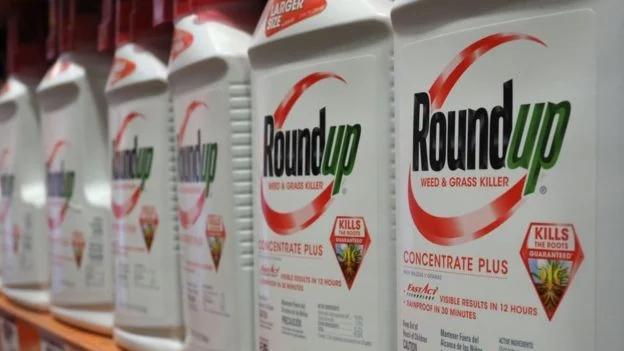Pharmaceutical group Bayer has dismissed claims that an ingredient used in weed killers is carcinogenic.
 |
| Many gardeners use the common weed killers |
The German company, which owns agriculture giant Monsanto, says herbicides containing glyphosate are safe.
On Friday, Monsanto was ordered to pay $289m (£226m) damages to a man who claimed the products caused his cancer.
A Californian jury said Monsanto should have warned users about the dangers of its Roundup and RangerPro weedkillers.
Bayer completed its $66bn takeover of Monsanto in June.
A Bayer spokesperson told the BBC the two companies operate independently. In a statement the company said: "Bayer is confident, based on the strength of the science, the conclusions of regulators around the world and decades of experience, that glyphosate is safe for use and does not cause cancer when used according to the label."
The landmark lawsuit was the first to go to trial alleging a glyphosate link to cancer.
The claimant, groundsman Dewayne Johnson, was diagnosed with non-Hodgkin's lymphoma in 2014. His lawyers said he regularly used a form of RangerPro while working at a school in Benicia, California.
He is among more than 5,000 similar plaintiffs across the US.
Glyphosate is the world's most common weedkiller. The California ruling could lead to hundreds of other claims against Monsanto.
The company said it intends to appeal against the verdict.
What is glyphosate and is it dangerous?
Glyphosate was introduced by Monsanto in 1974, but its patent expired in 2000, and now the chemical is sold by various manufacturers. In the US, more than 750 products contain it.In 2015, the International Agency for Research on Cancer, the World Health Organisation's cancer agency, concluded that glyphosate was "probably carcinogenic to humans".
However, the US Environmental Protection Agency (EPA) insists it is safe when used carefully.
The European Food Safety Authority (EFSA) also says glyphosate is unlikely to cause cancer in humans.
Last November 2017 EU countries voted to renew the licence of glyphosate despite campaigns against it.
BBC North American correspondent James Cook reported that in California - where a judge recently ruled that coffee must carry a cancer warning - the agriculture industry sued to prevent such a label for glyphosate, even though the state lists it as a chemical known to cause cancer.
See Also :: Monsanto ordered to pay $289m damages in Roundup cancer trial
What happened in the groundsman case?
Jurors found on Friday that Monsanto had acted with "malice" and that its weed killers contributed "substantially" to Mr Johnson's terminal illness.Following an eight-week trial, the jury ordered the company to pay $250m in punitive damages together with other costs that brought the total figure to almost $290m.
Mr Johnson's lawyer, Brent Wisner, said the jury's verdict showed that the evidence against the product was "overwhelming".
"When you are right, it is really easy to win," he said.
 |
| Dewayne Johnson reacting to the verdict in a San Francisco court |
How did Monsanto react?
"The jury got it wrong," vice-president Scott Partridge said outside the courthouse in San Francisco.In a written statement, the company said it was "sympathetic to Mr Johnson and his family" but it would "continue to vigorously defend this product, which has a 40-year history of safe use".
"Today's decision does not change the fact that more than 800 scientific studies and reviews - and conclusions by the US Environmental Protection Agency, the US National Institutes of Health and regulatory authorities around the world - support the fact that glyphosate does not cause cancer, and did not cause Mr Johnson's cancer," it added.












0 Comments:
Post a Comment